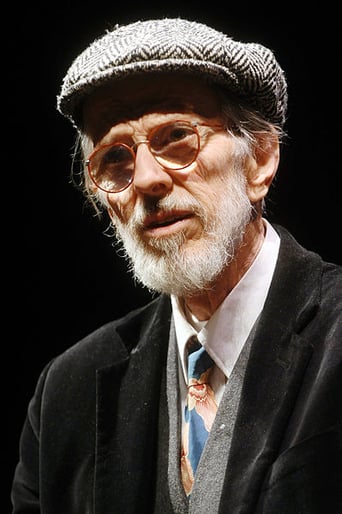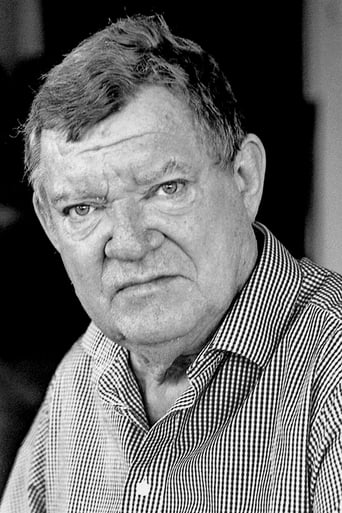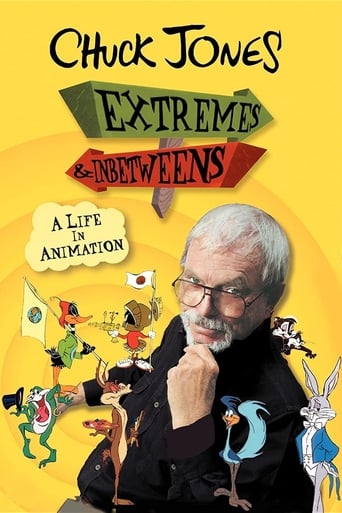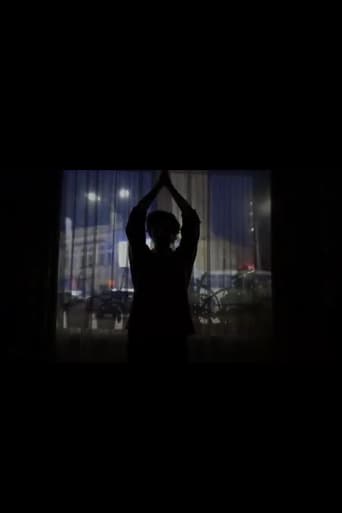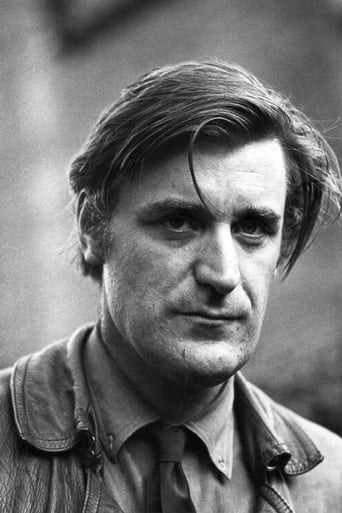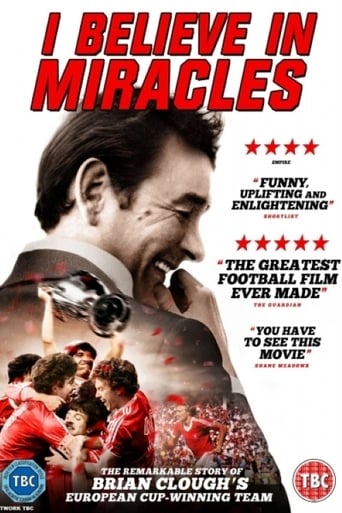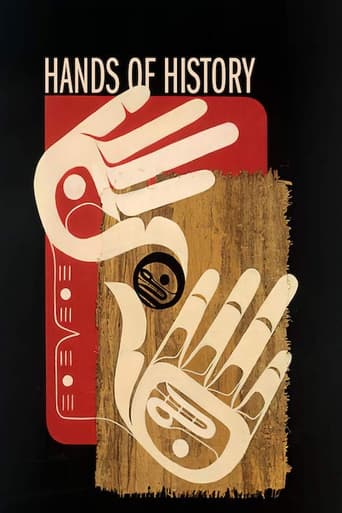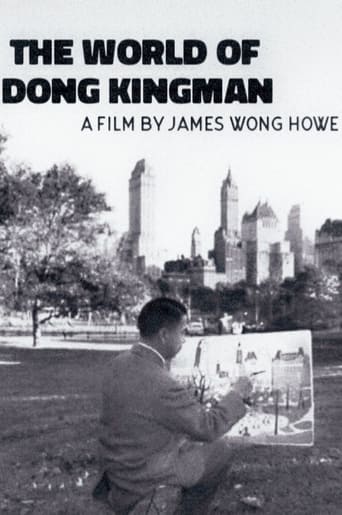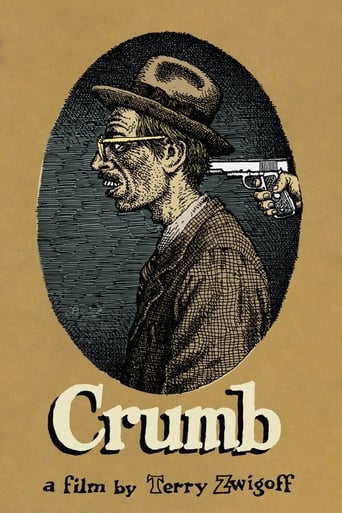
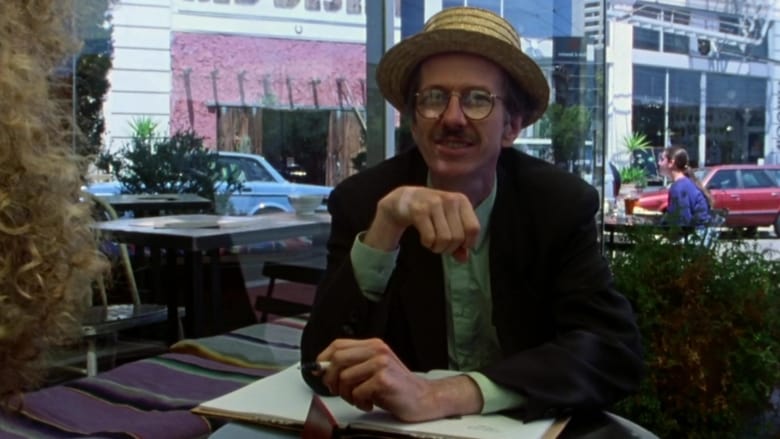
Crumb (1994)
This movie chronicles the life and times of R. Crumb. Robert Crumb is the cartoonist/artist who drew Keep On Truckin', Fritz the Cat, and played a major pioneering role in the genesis of underground comix. Through interviews with his mother, two brothers, wife, and ex-girlfriends, as well as selections from his vast quantity of graphic art, we are treated to a darkly comic ride through one man's subconscious mind.
Watch Trailer
Cast


Similar titles
Reviews
While a college student during the years 1968 through 1972, one of my electives was an English course taught by a free wheeling prof who's primary reading assignments consisted of Crumb comic books. I didn't know that when I signed up for the course, but even if I did it wouldn't have mattered because I didn't know who Robert Crumb was at the time. I could have opted to drop the class but then, as now, I was always interested in alternative points of view, so I stuck it out. Just like I stuck it out watching this flick, which for some I'm sure offers a semblance of artistic merit, but to my mind more closely approached publisher Deirdre English's assessment of her contemporary in the story, a study of Crumb as someone with an arrested juvenile vision.Physically, Crumb looks like an anorexic Grouch Marx, with Coke bottle eyeglasses and a temperament throughout the picture that seems to settle on a constant state of bemusement. This was all rather unsettling to me as he described what one might consider a horrific childhood, and if that weren't enough, he had two brothers who turned out even worse than he did. Charles Crumb, obsessed with comic books from an early age to the exclusion of all else, eventually committed suicide a short time after this film was released. Brother Maxon's maturity as an adult can be measured by the resentment he still feels for his role as a supply boy in his older brothers' childhood comics club.That Crumb would eventually find someone he could marry is puzzling given his masochistic and perverse views of women, but there wasn't just one, but two lucky women who tied the knot with the celebrated cartoonist. Both were interviewed for this film and they're not disparaging, perhaps a testament to the idea that they were just as weird as he was. In fact, Aline Crumb admits it - "My mind is shot..."Yet on another level I can relate to Crumb's detachment from a world that seems to depend on crass commercialism. However refusing to wear clothes that endorse commercial products is about as far as I go. I have to admit though, I was surprised by Crumb's refusal to accept a hundred grand for a publishing gig that would have cured a lot of his family's financial problems. In a certain sense, the man stayed true to his inner self, though for the life of me, I have no idea what kind of inner self that could possibly be.
Crumb is a documentary explaining the events that led artist Robert Crumb to create the comics he did. The whole family seems to have incredibly weird personalities and views toward sex.Robert's brother, Maxon, practices celibacy as sex triggers seizures for him. His other brother, Charles, has never had sex and is a recluse who lived with their mother up until his suicide. Robert himself is promiscuous and has feet and cartoon (especially to do with cartoons he has made) fetishes. Only a small amount of detail as to why all of these boys are so sexually inhibited is revealed. You do learn about their upbringing but not enough information is revealed to fully gauge why they ended up how they did. Some may disagree with that but I found that more backstory as to their upbringing would've provided greater insight into their situations.I mostly found this documentary extremely depressing. Robert himself says he lacks the ability to love anyone and the only person he loves is his daughter, Sophie. He doesn't mention feeling love for his son, Jesse, who seems a little heartbroken that he can't become closer with his father. Charles (at the time of recording before committing suicide) was on medication to deal with his mental problems. He goes into immense detail about his inability to feel connected to other people. Maxon seems just as strange as he swallows what I believe were pieces of cloth which he would digest in order to "clean out his insides". He also went into detail about pulling women's shorts down in public places and walking in on a woman who was naked in the bathroom, subsequently falling on the bathroom floor and having a seizure after looking at her.This documentary is fascinating, depressing, and leaves you asking more questions after finishing it. Definitely not a movie for a prudish person. But if this sounds interesting to you and you'd like to learn more I recommend you watch this movie.
Documentaries rarely get to the true heart of their subject, at least, none more than Crumb, Terry Zwigoff's passion piece on the work and soul of one Robert Crumb, comic-book innovator, serial piggy-back rider and loather of practically everything modern. The notoriously reclusive Crumb, who self-proclaims that he doesn't like to interact with people he isn't completely comfortable with, would normally be a near- impossible target for any self-respecting documentary film-maker to get even an interview out of. But life-long friend Terry Zwigoff, who reportedly threatened to kill himself if Crumb wouldn't allow him to film him, achieves an immaculately intimate portrayal of what drives the man, and how this strange and often extremely dark-humoured man came to be.Born in 1943 and growing up closely with his brother Charles and Maxon (he also has two sisters who declined to be interviewed), the brother's developed an early fascination with comic-books, mainly thanks to Charles' obsession with the medium. Living with a tyrannical father who often beat them, the three boys grew up extremely damaged and socially inept. Charles was good-looking but, as he describes, there was "just something wrong about me,", but Robert would use these experiences as amusing pieces in his sketches. As he got older, Robert wrote for Zap! Comics, and was one of the front-runners in the underground comic-book scene, where he developed the Keep on Truckin' serial, as well as his most famous characters Mr. Natural and Fritz the Cat.Given what seems like unprecedented access to Crumb, Zwigoff doesn't bombard the film with archive footage or talking head interviews (though there is a bit of the latter), he instead allows the story to be told by Crumb interacting with his family and friends, who all seem to regard the man with a lot of love, regardless as to how damaging he has been to their lives. We meet his two brothers - Charles still lives at home with his mother in a room piled high with literature, discussing his inability to get an erection due to the vast amounts of medication he has been given, and Maxon, having recently discovered his own artistic potential, is compelled to sit publicly on a bed of nails and pass linen through his body to cleanse his intestines. This isn't your typical all- American family.Which makes it interesting is that the idea of a husband happily greeting his wife and kids after a hard day's work to sit down to a wholesome dinner in middle-class suburbia, became one of the focal points of Crumb's work. It is something that obviously appals and amuses him, this idea of 1950's all-American perfection where consumerism took centre-stage and capitalism reared it's ugly head. He frequently refers back to a simpler time, where America lay relatively untouched, when people's problems were real and poured their souls into the blues songs he so obsessively loves and collects. His piece A Brief History of America, where a peaceful and green bit of land slowly gets taken apart and replaced by all manners of ugly wires, pylon's and advertising boards, shown here in the film, is especially powerful.Zwigoff isn't afraid to show the dark and ugly side of Crumb either. Shown sketching random passers-by on the street, he formidably judges and satirises them without uttering a word to them. This is a man whose opinion of humanity is nigh-on misanthropy, voicing his disgust at the brands and slogans people feel compelled to wear. His work also went places that most people would leave untouched, such as N****r Hearts, where a perfect, all-white family sit down to a dinner of African- American organs, or the sketch in which a man and his friend rape a woman with no head (later revealed to have been simply pushed down within her). He's certainly a troubled man, but all great geniuses are, or at least should be, and Crumb the film lays it out on the table. Undoubtedly one of the greatest documentaries ever made.www.the-wrath-of-blog.blogspot.com
Primarily: You are in the presence of a master creating and displaying his art, and throughout these portions of the film any kind of artist will find much to learn from this man. The comparison made that he is the "modern" Dürer is very apt.Secondarily: You are watching one the most humorous and (blackly) entertaining films ever produced anywhere. Yes, we are reassured once again that an (the) artists' personality(ies) cannot never be confused with or substituted for the work they have give us; the strongest humor comes from the aon-old maxim the truth is stranger than fiction...p.s. One last thing - had seen this piece over a decade ago, but a recent review of Crumb's 2009 outstanding "Genesis" work led back here and there to review. If you haven't read it yet do it tonight/day!


